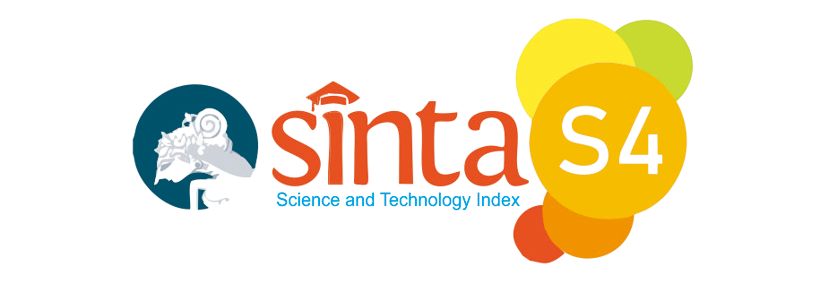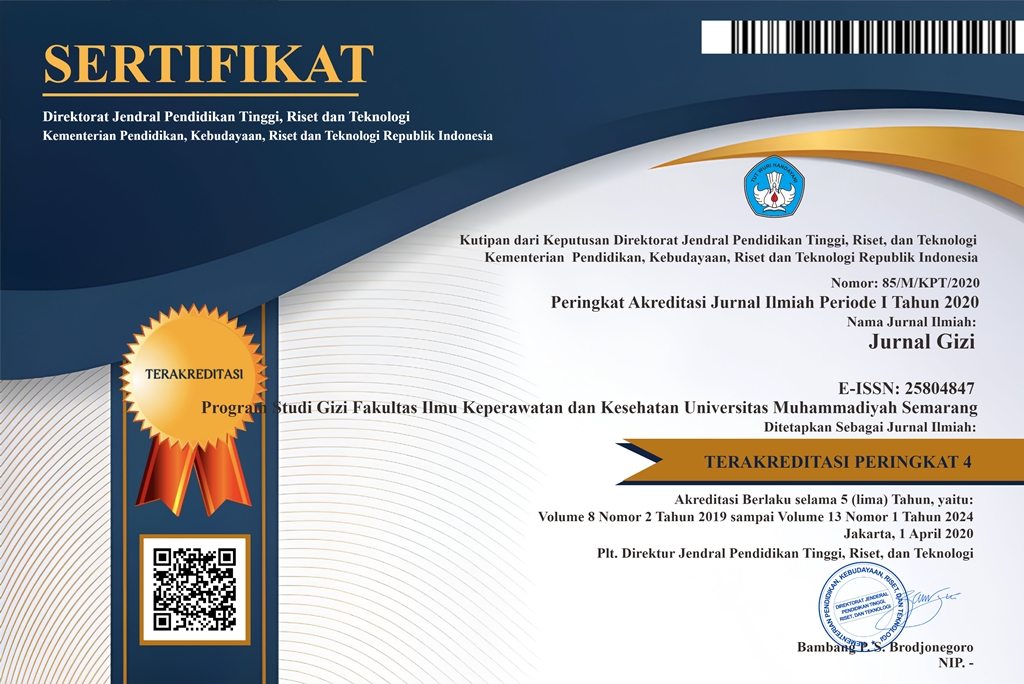Hubungan Asupan Protein, Vitamin A, Zink, dan Fe dengan Kejadian Stunting Usia 1-3 Tahun
(1) Program Studi Gizi Fakultas Kesehatan Universitas Aisyah Pringsewu
(2) Program Studi Gizi Fakultas Kesehatan Universitas Aisyah Pringsewu
(3) Program Studi Gizi Fakultas Kesehatan Universitas Aisyah Pringsewu
(4) Program Studi Gizi Fakultas Kesehatan Universitas Aisyah Pringsewu
(*) Corresponding Author
Abstract
Stunting is a condition in which toddlers have a length or height that is less than their
age. The purpose of this study was to determine the relationship between intake of protein,
vitamin A, zinc, and iron with the incidence of stunting in children aged 1-3 years.
The design used in this study is quantitative by using the Case Control approach. Subjects
involved in the study were 60 toddlers aged 1-3 years. 30 toddlers as the case group and 30
toddlers as the control group at the North Raman Health Center, East Lampung Regency.
Bivariate analysis in this study used the Chi Square Test.
The results of the analysis using the Chi Square test showed that there was a relationship
between protein intake and the incidence of stunting (p = 0.000); there is a relationship between
zinc intake and the incidence of stunting (p = 0.001); there is a relationship between BSI intake
and the incidence of stunting (p = 0.005). However, there was no relationship between vitamin A
intake and the incidence of stunting (p = 0.078). The conclusion of the research that the genesis
of stunting was correlated to the intake of protein, zinc and iron but it was not correlated to the
intake of vitamine A.
Keywords: Stunting, Protein, Vitamin A, Zinc, and Iron
age. The purpose of this study was to determine the relationship between intake of protein,
vitamin A, zinc, and iron with the incidence of stunting in children aged 1-3 years.
The design used in this study is quantitative by using the Case Control approach. Subjects
involved in the study were 60 toddlers aged 1-3 years. 30 toddlers as the case group and 30
toddlers as the control group at the North Raman Health Center, East Lampung Regency.
Bivariate analysis in this study used the Chi Square Test.
The results of the analysis using the Chi Square test showed that there was a relationship
between protein intake and the incidence of stunting (p = 0.000); there is a relationship between
zinc intake and the incidence of stunting (p = 0.001); there is a relationship between BSI intake
and the incidence of stunting (p = 0.005). However, there was no relationship between vitamin A
intake and the incidence of stunting (p = 0.078). The conclusion of the research that the genesis
of stunting was correlated to the intake of protein, zinc and iron but it was not correlated to the
intake of vitamine A.
Keywords: Stunting, Protein, Vitamin A, Zinc, and Iron
Full Text:
PDFArticle Metrics
Abstract view : 1232 timesPDF - 675 times
DOI: https://doi.org/10.26714/jg.11.1.2022.9-15
Refbacks
- There are currently no refbacks.

This work is licensed under a Creative Commons Attribution 4.0 International License.
Diterbitkan oleh: Program Studi Gizi (D3 dan S1)
Fakultas Ilmu Keperawatan dan Kesehatan
Universitas Muhammadiyah Semarang
Sekretariat: Jl. Kedungmundu Raya No. 18 Semarang
Contact Person : Hapsari Sulistya Kusuma, S.Gz, M.Si (+62 85 6 41 536 553)

This work is licensed under a Creative Commons Attribution 4.0 International License.










.png)
.png)
_.png)